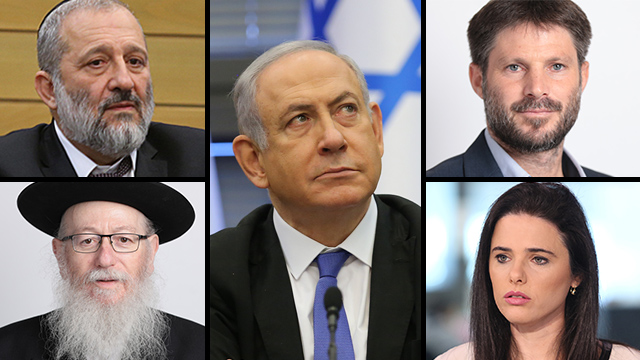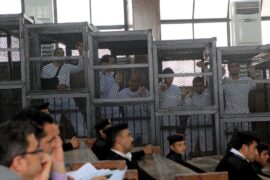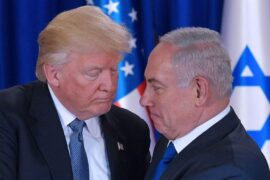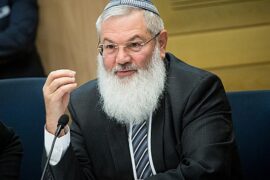One of the most counterproductive habits displayed when discussing our country’s politics is the clumsy application of Western political framings onto Israeli society. This mistake is often exacerbated by the use of foreign terms like “right” and “left” by many Israelis ourselves to describe positions and identities that rarely fit what those terms mean elsewhere in the world.
Descending from an ancient Semitic people with a rich civilization, Jews are unique in that we managed to survive nearly 2,000 years of exile from our land with a portable version of our civilization before finally returning home and attaining political independence. As a result, Israel can’t be properly understood within the paradigms or experiences of other peoples.
Based on a recent discussion I had with Rav Mike Feuer on The Next Stage podcast, I’ve ventured to formulate more helpful terminology for understanding Israel’s political map that draws from the unique characteristics of the Hebrew tribes as explained by Manitou.
While these tribes were once biological (and some Jews today still know the exact tribe we descend from), it’s helpful to see each tribe as an archetype for a specific camp within the Jewish people – especially but not exclusively within the State of Israel. In more mystical terms, each tribe should be understood as a specific shade of Israel’s collective soul that shines into this world through different types of Jews.
The Tribe of Yosef
Most of Israel’s current political parties should be seen as expression of the tribal force of Yosef.
The tribe of Yosef emphasizes the features of Jewish identity that we share in common with other nations – especially the dominant civilizations of any given period. In Yosef ben Yaakov’s generation, that civilization was Egypt. Yosef looked like an Egyptian to the extent that even his brothers didn’t recognize him.
In modern times, when the West – led by the United States – has become the dominant civilization on the world stage, the force of Yosef manifests as Jews who to a certain extent adopt the identity, values and dominant ideological paradigm of Western civilization.
Yosef is also primarily focused on the economic and security concerns that pertain to Israel’s material wellbeing. We should understand the Zionist movement, which struggled for Jewish material liberation via the tools of European nationalism (and colonialism) to be the movement of Mashiaḥ ben Yosef that rebuilt Israel’s national body.
Because Yosef built the State of Israel and established most of its dominant institutions, Zionism is the dominant ideology of Israeli society, despite having lost most of its revolutionary momentum in recent decades. But back when it was a powerful idea that addressed pressing Jewish needs, Zionism had several tendencies that today find expression in various Israeli political parties.
Labor Zionism, which had been the dominant Zionist tendency during the British Mandate period and the first three decades of Jewish independence, is still the official guiding creed of the dwindling Labor and Meretz factions (although a shift away from socialist principles in recent decades has led to its transformation into what’s commonly referred to as Liberal Zionism).
Revisionist Zionism is upheld by the Likud, New Hope and arguably the Yamina (which can also sometimes features a small dash of Religious Zionism) and Yisrael Beiteinu factions. A mix of General and Liberal Zionism finds expression in the Yesh Atid and Blue & White parties favored by Israel’s wealthiest voters. All of these factions – despite their many political distinctions – should be seen as expressions of Yosef.
Because Yosef today manifests in Jews who see themselves and the State of Israel as part of the West and expresses what Israel shares in common with Western civilization, Yosef includes a broad linear political spectrum ranging from liberal to conservative that roughly resembles the political spectrums of Western nations. If these Yosef expressions were Israel’s only political factions, a sociopolitical understanding of Israel could be possible through a Western framing. But such framings become sloppy and fall short when applied to our non-Yosef parties that stand outside of this spectrum.
The Tribe of Yissakhar
The clearest example of parties that exist beyond a linear Western political spectrum would be Israel’s ḥaredi factions – Shas and United Torah Judaism – who we should relate to as expressions of the tribe of Yissakhar. Those seeking to fit Israel into a Western political context might be tempted to equate this camp with the Christian right in the United States. But such comparisons fall short due to the radically different cultures, histories and political interests of these groups, as well as the countless important differences between Israel’s Torah and Christianity.
Although the tribe of Yissakhar is strong in Torah and many of its ancient leaders served on Israel’s high court, its tendency has always been to prefer the quiet life of learning and teaching over becoming too involved in commerce or statecraft (its material needs were largely supplied by the merchant tribe of Z’vulun in ancient times). Following the European Enlightenment and the Haskalah (its Jewish equivalent), Yosef and Yissakhar were the two most dominant Hebrew tribal identities in European countries, expressed respectively through Jewish assimilationists and traditionalists.
While Yosef Jews sought to enter European society and fully engage the world around them, Yissakhar Jews turned increasingly inward and championed tradition, dedication to Israel’s ancient laws and a communal life isolated from gentile host nations (both had been heavily impacted by European concepts of “religion” that altered Jewish self-identification in Europe and gave rise to Christian-influenced denominations like “Reform” and “Orthodox”).
And while the Haskalah certainly created many of the conditions that led to the rise of the Zionist movement, Zionism – the movement of Mashiaḥ ben Yosef – also challenged a very central tenet of Haskalah thinking by reminding us that Jews are not actually “Europeans with a Jewish religion” but rather a single people scattered throughout the world that share ancestry, a common homeland, an eternal bond and a collective destiny. Zionism – the movement that focused on the material rebuilding of the nation of Israel – was first and foremost meant to be a movement for reuniting scattered Jews and reminding us of our mutual responsibility.
For all its many flaws, the Zionist movement restored to the Jewish people a national consciousness and sense of collective responsibility. These had been deep values in our Torah and ancient culture that had been obscured by centuries of exile and the alluring temptations of Jewish emancipation in the newly enlightened European nation-states. Even the Torah world expressing the force of Yissakhar had forgotten these values and to a certain extent opposed them as part of its backlash to the Haskalah and broader hostility towards any movement that appeared to challenge Jewish tradition.
Yissakhar’s approach may have protected many aspects of Jewish identity in the exile (most notably the legal and ritual aspects), but once Israel returned home to independence in our land, it began to present a danger in that it led many otherwise pious Jews to the conclusion that there’s actually no need for the Jewish people to possess political independence. Emphasizing personal and communal piety while relating to the management of a nation-state as a useless burden has caused many devout Jews to shun participation in our state and avoid political responsibility for the broader Hebrew mission.
It should be noted, however, that these identities are fluid and that the younger generation of ḥaredi Israelis have been adopting a more nationalist orientation in recent years. The ḥaredi sector is Israel’s fastest growing population and as it continues to grow, it shows clear signs of shifting from Yissakhar to something else (more on this further down).
The Tribe of Z’vulun
The tribe of Z’vulun should be understood as those Jews fully involved in material pursuits while possessing a worldview that shares basic tenets with that of Yissakhar (and even sometimes Yehuda and/or Shimon). Z’vulun Jews are successful at accumulating wealth and tend to be generous supporters of Torah institutions and Jewish national causes.
The Tribe of Dan
The tribe of Dan should be seen as the extreme expression of Yosef that has become so universalist within the paradigm of a foreign civilization that it has trouble maintaining any Jewish national consciousness.
In contemporary Israel, this tribal force manifests as those Jews who vote for Palestinian political factions. In the Diaspora, Dan is expressed through Jews actively organizing and taking positions against the State of Israel.
Unlike the Liberal Zionist factions of Yosef that hold positions and champion values similar to bourgeois liberal parties in the West, Dan for the most part embraces the positions of the principled left.
The Tribes of Yehuda, Shimon & Levi
The national-religious sector that emerged following the 1967 Six Day War – and led the movement to populate the newly acquired territories – constitutes the tribal force of Yehuda. Its focus is less about Israel thriving in the current global order and more about the historic importance of the Jewish national rebirth.
Like Yosef, Yehuda is one of Israel’s leadership tribes. But while Yosef emphasizes what Israel shares in common with the rest of humanity – especially the dominant nations of any given period, Yehuda focuses on what’s different and unique about the Jewish people’s identity, worldview and historic mission. Unlike the European-style nationalism expressed by the more right-wing manifestations of Yosef, the national consciousness of Yehuda is deeply rooted in Israel’s Torah and unique culture.
Yehuda acknowledges and appreciates that Yosef rebuilt the Jewish national body but sees itself as responsible for providing the national spirit that will ultimately direct that body. Because Yehuda is more concerned with Jewish history from a macro perspective, as well as the historic significance of rebuilding Hebrew civilization, places like Shkhem, Shilo, Beit El, Jerusalem and Hebron are given more central importance than they are in the worldview of Yosef.
The force of Yehuda is most acutely expressed through the ideologically-driven Jews living in the West Bank and others who experience themselves as fully living Jewish history – most notably the graduates of the many educational institutions loyal to the teachings of HaRav Avraham Yitzḥak HaKohen Kook. In terms of its understanding of Jewish identity, history and destiny, Yehuda is the most advanced segment of Israeli society and possesses much revolutionary potential. But it’s not as capable as Yosef at building economies, armies and other national institutions. Yehuda is a force that lacked the body to express itself in the Diaspora and therefore required Zionism’s success to reemerge after centuries of dormancy in exile. It therefore sees itself as the force meant to provide identity, spiritual content and direction to the national body Yosef successfully built.
The tribal force of Yehuda is expressed in Israeli politics today through Betzalel Smotrich’s Religious Zionism faction. Its partners, Otzma Yehudit and Noam, represent the tribal forces of Shimon and Levi respectively – both extreme satellite expressions of the Yehuda force (in different ways). Despite the current name of its political party, the force of Yehuda shouldn’t be confused with Religious Zionism – which is technically best represented by Torah observant Jews of the Yosef persuasion (like the “religious” lawmakers scattered throughout the Yamina, Likud and even Yesh Atid factions). It’s ironic that the only party to currently use the term “Zionism” in its official name is the Religious Zionism party that isn’t truly Zionist (Yosef).
Smotrich’s national religious party actually represents an ideological tradition that paralleled Zionism and supported Zionism but wasn’t itself Zionist in the technical sense. Rav Kook, whose students serve as the spiritual leaders of Smotrich’s party, clearly identified Zionism as the movement of Mashiaḥ ben Yosef but at the same time stated that it was too shallow an ideology to sustain a living nation, let alone revive a dead one. Rav Kook nevertheless supported Zionism from without and recognized it as the movement bringing Israel back to life. But unlike Religious Zionism – which attempted to synthesize Zionism (Yosef) with personal Torah observance – Rav Kook’s followers represent the tribal force of Yehuda and tend to psychologically live in the Jewish national story and understand the world through lessons learned from our history, the statutes of our Torah and prophetic ideas pertaining to Israel’s collective mission.
When any given social or political issue arises, Israelis with a more Yehuda orientation tend to see the issue through the prism of Israel’s history spanning thousands of years. They might even cite Biblical examples for how our people responded to certain challenges in ancient times in order to advocate for similar policies today.
Israelis with a more Yosef orientation tend to look at the very same social or political issues through the lens of what’s universally considered just according to the values of what they perceive to be the most morally advanced civilization of the time. So Yehuda and Yosef generally look at the same issues and come to radically different conclusions.
Yehuda can generally work with the more nationalist expressions of Yosef (Kohelet for example) but often sees the universalist orientation of Yosef’s more liberal manifestations as stemming from a weak connection to Jewish values and an unhealthy need to gain acceptance from the outside world. While some of the more right-wing expressions of Yosef can appreciate and work with Yehuda, Yosef’s more liberal expressions tend to see Yehuda’s particularist orientation as dangerously ethnocentric and out of touch with the more enlightened modern world.
Just as Dan is perceived by Yehuda to be more dangerous than even Yosef’s liberal manifestations, Shimon and Levi are seen by Yosef as more frightening than Yehuda. One contemporary expression of the tribe of Shimon is the kahanist worldview that essentially combines a Ḥaredi understanding of Torah with Jewish national consciousness. The fact that many young Ḥaredi Israelis are to various degrees leaving the Yissakhar camp and becoming expressions of Shimon through a more overt embrace of Jewish nationalism could potentially make Shimon the fastest growing tribe between the river and the sea.
Levi is largely expressed through the “kavnick” ideological purists within the Rav Kook camp that primarily focus on fighting a culture war against the westernization of Israeli society but have trouble articulating their positions in a way that isn’t deeply offensive to Yosef. While Shimon – like Yissakhar – has trouble respecting Yosef, Levi is able to abstractly appreciate Yosef’s role in reviving the nation (Yehuda possesses an even broader perspective that makes it capable of appreciating the deeper value of each tribal force in more practical terms).
Despite the fact that Zionism succeeded in changing the reality of Jewish existence (the issues it set out to address no longer plague the Jewish people as they once did), it did create a whole new set of challenges that it doesn’t possess any answers for.
Zionism today is able to focus on the State of Israel’s security, economy and attempts to become a “normal” nation that fits in with the bourgeois “democracies” of the West. But it lost its relevance and revolutionary vigor following the Six Day War, when the Jewish people became ready for a new liberation movement. It’s my hope that a more precise understanding of Israel’s political map within the framework of our own unique identity and worldview will serve to help us more effectively create such a movement.






So where would the Teaneck, Five Towns and Englewood, NJ people, who fund a lot of the Yehuda projects by way of living a “Yosef life” in America…fall in?
Are they in both camps, depending on the situation?
Do they leave Yosef and move to Yehuda when making aliyah?
Or are the disguising themselves as Yosef?
Z’vulun